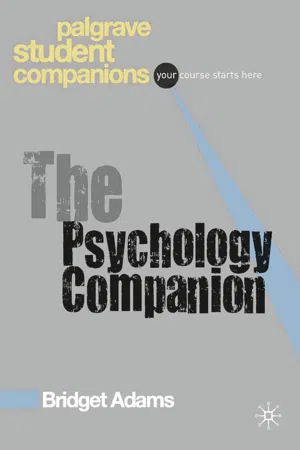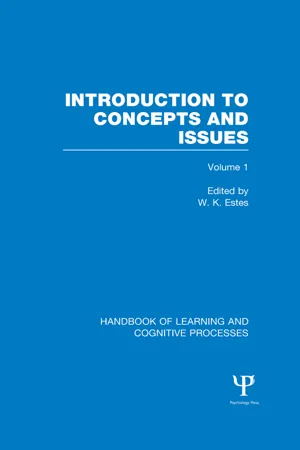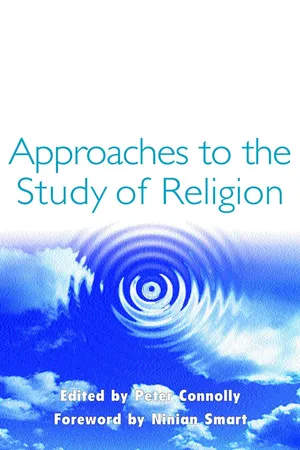Psychology
Comparison of Approaches Psychology
The comparison of approaches in psychology involves evaluating different theoretical perspectives and methodologies used to understand human behavior and mental processes. Key approaches include behaviorism, psychoanalysis, cognitive psychology, humanistic psychology, and biological psychology. Each approach offers unique insights into the complexities of the human mind and behavior, contributing to a comprehensive understanding of psychological phenomena.
Written by Perlego with AI-assistance
Related key terms
1 of 5
4 Key excerpts on "Comparison of Approaches Psychology"
- eBook - ePub
- Bridget Adams(Author)
- 2009(Publication Date)
- Bloomsbury Academic(Publisher)
2 approaches in psychology approaches 2.1 Ways of looking at the behaviour and minds of people 2.2 Core approaches 2.3 Other approaches 2.1 Ways of looking at the behaviour and minds of people Scientific nature of enquiry Like all methods of enquiry, in history, philosophy, literature and so on, the purpose of scientific research is to increase our knowledge and understanding. All science is concerned with similarities between things in the search for the underlying ‘oneness’ of the universe (see Metaphysics below) and in defining the differences that enable us to label and classify. Some definitions of science Allport (1947): [Science provides] understanding, prediction and control above the levels achieved by unaided common sense. Wright et al (1970): The term ‘experimental psychology’ has been used for several decades to refer to scientific psychology, which uses mainly experimental methods, as opposed to kinds of psychology based mainly on philosophic or therapeutic considerations. . . . Psychology bridges the gap between the biological and the social sciences. Searle (1989: 11): All sorts of disciplines that are quite unlike physics and chemistry are eager to call themselves ‘sciences’. A good rule of thumb to keep in mind is that anything that calls itself ‘science’ probably isn’t – for example, Christian science, or military science, and possibly even cognitive science or social science. . . . There is only knowledge and understanding. . . . some disciplines are more systematic than others, and we might want to reserve the word ‘science’ for them. Collingwood (1998: 4): The word ‘science’, in its original sense, which is still its proper sense not in the English language alone but in the international language of European civilization, means a body of systematic or orderly thinking about a determinate subject matter. . . . There is also a slang sense, unobjectionable (like all slang) on its lawful occasions. . - eBook - ePub
Handbook of Learning and Cognitive Processes (Volume 1)
Introduction to Concepts and Issues
- W. Estes(Author)
- 2014(Publication Date)
- Psychology Press(Publisher)
4
Douglas Medin Michael Cole Rockefeller UniversityComparative Psychology and Human CognitionOne of the strange aspects of writing an article advocating comparative research on human cognition in the latter quarter of the twentieth century is that the idea is at least a century old. Darwin’s famous study of the expression of emotions in man was but one of many essays in comparative psychology in the last century. In the current century there have been several attempts to incorporate comparative research into the main body of psychological theory (Werner, 1948).Generally, however, these attempts were not particularly influential, mainly, in our opinion, because neither cognitive theories nor comparative research strategies had evolved to the point where there was a strong basis for positive interaction between the two.In this presentation we would like to consider the theoretical and practical advantages to be gained from the inclusion of a wide range of subject populations and behaviors in a general psychology of human cognition. Our goal is to provide a framework for evaluating and integrating data gathered from diverse subject populations. We hope to demonstrate that this framework can be useful to the comparative researcher interested in the basis of group differences and can be relevant to understanding cognitive processes independent of any special interest in comparative enterprises. The domain of comparative research in this article is intended to include at least phylogenetic, developmental, and cross-cultural comparisons because we believe that there is a logic to the comparative approach that is basically similar, regardless of whether we are looking at comparisons across cultures, across species, or across ages within a species. Further, we maintain that studies of special groups, whether they are particular species, ages, or cultural groups, can be more enlightening if the research is appropriately guided by theoretical considerations. - Lorelle J. Burton, Drew Westen, Robin M. Kowalski(Authors)
- 2022(Publication Date)
- Wiley(Publisher)
CHAPTER 1 Psychology: the study of mental processes and behaviour LEARNING OUTCOMES After studying this chapter, you should be able to: 1.1 defne psychology 1.2 discuss the contributions of biopsychology and the sociocultural perspective 1.3 outline the history of psychology 1.4 distinguish among the major theoretical perspectives in psychology 1.5 discuss the educational requirements for psychologists and outline their most common work settings. CONCEPT MAP Psychology: the study of mental processes and behaviour Psychology • Psychology is the scientifc investigation of mental processes (thinking, remembering and feeling) and behaviour. Understanding a person requires attention to the individual’s biology, psychological experience and cultural context. The boundaries and borders of psychology • Biopsychology examines the physical basis of psy- chological phenomena such as motivation, emotion and stress. • The sociocultural perspective represents a modern approach to psychology that emphasises social inter- action and the cultural determinants of behaviour and mental processes. • Cultural and cross-cultural psychologists each adopt the approach that content and context of a culture, rather than absolute universal truths, are important considera- tions in the study of human behaviour. History of psychology Philosophical roots of psychological questions • Free will or determinism: do we freely choose our actions or do things outside our control determine our behaviour? • Mind–body problem: the question of how mental and physical events interact. From philosophical speculation to scientifc investigation • Wilhelm Wundt founded the frst psychological labora- tory in 1879. • Two prominent early schools of thought were structuralism (uncover the basic elements of cons- ciousness through introspection) and functionalism (explain psychological processes in terms of the role, or function, they serve).- eBook - PDF
- Peter Connolly(Author)
- 1999(Publication Date)
- Continuum(Publisher)
Religious psychology has also blossomed in diverse ways, perhaps finding its most prominent expres-sion in transpersonal psychology. Each of these developments is rooted in different notions about the characteristics of psychology, particularly with regard to its purpose and its methodology. Principal characteristics of psychological approaches Disciplines within the social sciences are rarely as unified as their counterparts in the natural sciences. It is appropriate to speak in terms of'branches' when referring to the specialisms of researchers in physics or chemistry or biology. Some physicists concentrate on nuclear or subatomic processes, others on cosmology, others on electromagnetism and so on, yet they are in substantial agreement about the nature of the physical universe which is the object of their study. The same cannot be claimed for sciences such as psychology. This is hardly surprising for, as zoologist Richard Dawkins points out, 'We animals are the most complicated things in the known universe'. 9 Consequently, psychology presents us not with 'branches' which are, at least in principle, mutually illuminating, but with 'schools' which frequently offer radically differ-ent and often conflicting views about the nature of the human psyche and the best way of studying it. One way of locating these schools in relation to each other is to focus on the methods they employ to obtain information and to test or support the theories they generate. In social science the word 'hard' is often used to characterize those approaches which seek to approximate 143 PETER CONNOLLY the rigour of the natural sciences in terms of theory formation and testing. Experimentation and mathematical analysis lie at the heart of such approaches. By contrast, those approaches which emphasize observing people in natural settings or joining them in various activities or talking with them tend to be characterized as 'soft'.
Index pages curate the most relevant extracts from our library of academic textbooks. They’ve been created using an in-house natural language model (NLM), each adding context and meaning to key research topics.



